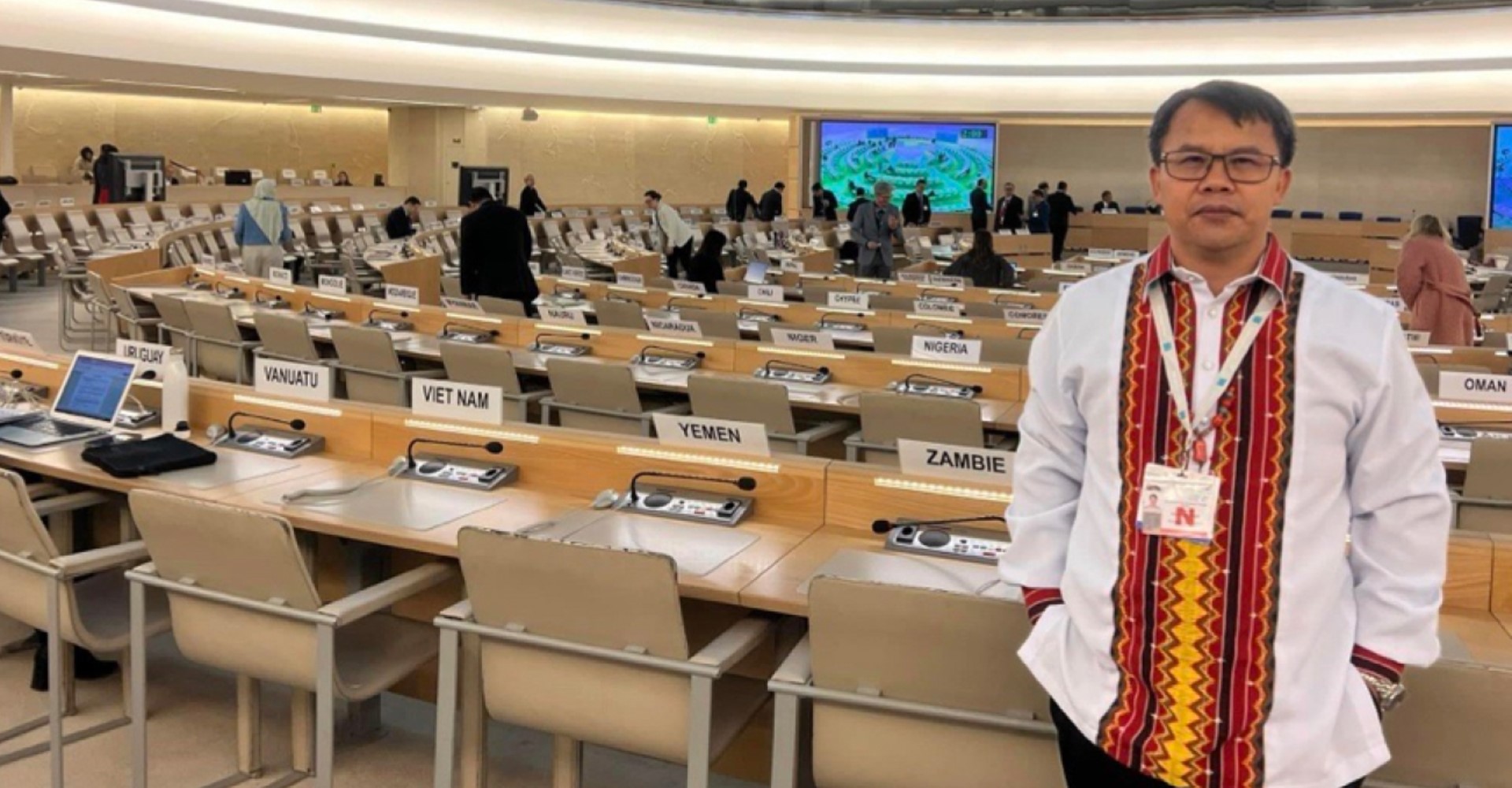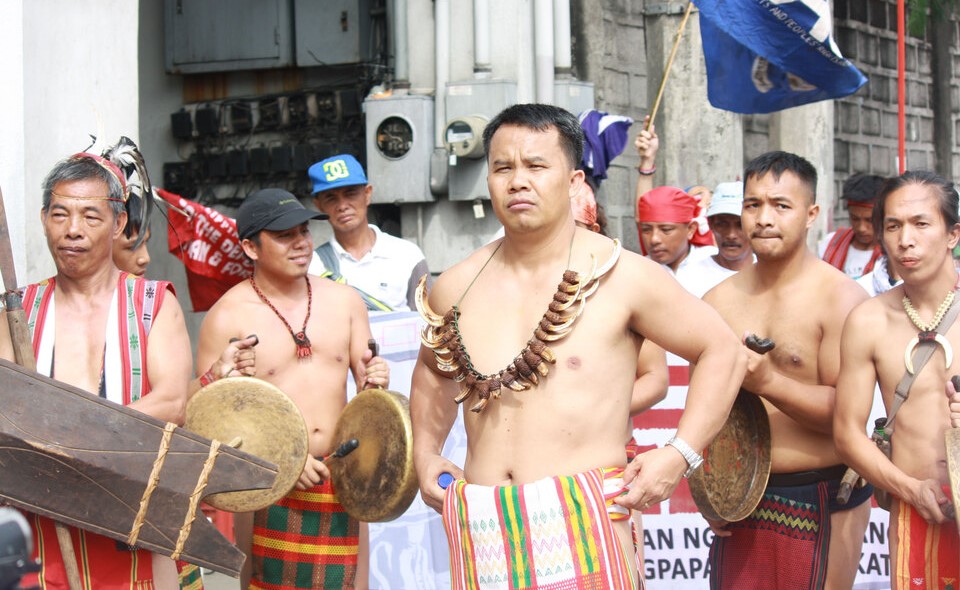Windel Bolinget: "We must not allow States to monopolize the Universal Periodic Review"

BY LOLA GARCÍA-ALIX FOR DEBATES INDÍGENAS
During his first participation in one of the sessions of the Human Rights Council’s Universal Periodic Review (UPR) and before the review of the State of the Philippines started, Windel Bolinget, General Coordinator of the organization Cordillera Peoples Alliance (CPA), warned that the government has not complied with the recommendations made by the UPR in previous reviews. While the indigenous leader stresses the importance of the process, he regrets that indigenous peoples cannot speak at the official level. Despite the fact that the government of the Philippines has so far ignored all the recommendations previously made, Windel Bolinget is betting on maintaining his hope that the international community will put a stronger pressure into the Philippine government to comply with its obligations to respect and protect human rights, and in particular the rights of Indigenous Peoples.
Lola García-Alix: As an indigenous rights defender, who has faced been persecution and criminalization, do you think that the Universal Periodic Review (UPR) is a useful mechanism for the protection of human rights and in particular of the rights of Indigenous Peoples?
Windel Bolinget: Yes, we think that the Universal Periodic Review Mechanism is useful because it deals with human rights, which are the essence of the rights of Indigenous Peoples and, therefore, it is important for us to participate and engage in this process. However, the UPR procedures do not allow Indigenous Peoples to speak directly: it is only States that can speak and make recommendations to the State under review. Despite this, we, Indigenous Peoples, can use this instance to amplify our voice, call for the attention of the international community and urge them to consider our problems. Particularly, in my case, it is very important, since I am politically persecuted by the government of the Philippines due to my commitment to the defense of the rights of Indigenous Peoples in my country.
LGA: If only States can speak formally during the sessions, what possibilities does your participation in the UPR session offers you?
WB: We should not allow only the governments and States to monopolize this process. Even though we are not allowed to speak during the session, there are other avenues where we can present our issues, inform about our human rights situation and tell the truth about the situation in the country. Our participation in the sessions of the Universal Periodic Review gives us the opportunity to speak with governments, international institutions, civil society organizations and indigenous rights defenders from other countries. It is very important that Indigenous Peoples themselves inform the world and the United Nations system that the Philippine government is not complying with its commitments and obligations in the field of human rights nor with international humanitarian law and in particular with the rights of indigenous peoples.
LGA: Do you think that Indigenous Peoples should assess the importance of the Universal Periodic Review as a human rights mechanism to advance in the protection of your rights?
WB: I believe that it is high time to assess and discuss the importance of this tool for the protection of indigenous peoples ‘rights. This mechanism reviews human rights and democracy: precisely two fundamental aspects for the rights of Indigenous Peoples. I therefore think it is important that the world's Indigenous Peoples strengthen our cooperation and commitment, and maximize the process for the benefit of our peoples.
 Windel Bolinget has been criminalized by the government of the Philippines. He has received the support of the international community in the face of the false accusations raised by the government against him.
Windel Bolinget has been criminalized by the government of the Philippines. He has received the support of the international community in the face of the false accusations raised by the government against him.
LGA: ¿ What do you think about the report that the Philippine government will present to the UPR?
WB: The Philippine government tells falsehoods about the situation of Indigenous Peoples' rights: they are claiming that they respect them when that is not the case. In the last Universal Periodic Review, where the government of the Philippines was reviewed, which was carried out in 2017, the representatives of the State accepted several recommendations made on the implementation of the rights of Indigenous Peoples, but in practice, in reality, they have not complied with none of them, nor are they being implemented.
LGA: ¿What do you expect from the recommendations to be made after this session’s review?
WB: This will be the fourth cycle (2022 – 2027) in which the government of the Philippines will be reviewed. Good and relevant recommendations were made in previous reviews. However, in the Philippines and in our communities, the situation did not improve. While the recommendations were good, unfortunately, they did not translate into action on the ground. We are the ones who know the reality of indigenous rights in the territories, so we should be the ones who should be able to present the situation here: "Nothing about us, without us". Therefore, I do not expect much from this process. I can only hope that states will put more pressure on the Philippine government to translate the recommendations into concrete action.
LGA: Do you hope that the human rights situation in the Philippines will improve?
WB: Knowing the history of the Philippines, marked by the continuous violation of the rights of Indigenous Peoples, there is not much to expect. However, our hope is to continue to assert our rights and to tell the United Nations and the international community that action must be taken. Otherwise, the violation of human rights and Indigenous Peoples will continue, and the impunity with which human rights violations are committed will intensify.
Tags: Indigenous Debates



